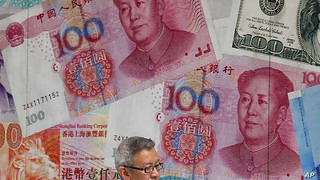
PREV ARTICLE
NEXT ARTICLE
FULL ISSUE
PREV FULL ISSUE
CHINA’S DIGITAL CURRENCYKavan Ratnatunga forwarded two articles on China’s Digital Currency plans. Thanks. -Editor
The explosive rally of digital currency-related stocks followed news that after several years of anticipation, China’s government released a timeline for rolling out its new digital currency in four cities. In the next month, government workers in these cities will use a smartphone application to receive at least a portion of their paychecks in the form of a digital payment, marking a milestone on the path toward the world’s first digital currency system by a major central bank. To some experts, the digital currency could represent a serious threat to an American asset that has reigned unchallenged for decades: the U.S. dollar. With so much of the world dependent on U.S. banking, it can mean that even companies with no U.S. operations still depend on the American financial system. “Even a company that has basically no trade in the United States, their banks do,” Jarrett Blanc, a senior fellow at the Carnegie Endowment for International Peace, told The Atlantic last year. Because of that unique power, organizations like Iran’s Islamic Revolutionary Guard Corps and countries like North Korea feel the bite when they are sanctioned by Washington. Starting in 2014, China saw digital currencies as a way of shifting away from U.S. dollars. It has since made advancing digital currency technology a key national strategic goal. National economic plans in 2016 mention advancing blockchain, the technology behind popular digital currencies such as Bitcoin. Experts pointed out that China’s proposed digital currency bypasses the Western banking system, including SWIFT, the Belgium-based Society for Worldwide Interbank Financial Telecommunication, that enables financial institutions worldwide to securely send and receive information about transactions. To preserve the dollar’s status, analysts have been warning recently that the United States cannot afford to let China get ahead on cryptocurrency. Tim Morrison, a senior fellow at the Hudson Institute who served as a special assistant to President Donald Trump, told VOA that he believes the prospect of Beijing “dominating this emerging financial technology should be alarming.” In the United States, digital currencies are still in the planning stages. Facebook announced last summer a global digital currency called Libra, but it is still trying to win approval from regulators. Earlier in April, U.S. lawmakers introduced a bill that would authorize the Federal Reserve to create “Digital Dollar Account Wallets" called “FedAccounts” to distribute stimulus checks to business and citizens. Although it is impossible to predict whether or when the dollar will be dethroned, an opinion piece reprinted by China's Commerce Ministry on its official website six years ago, when China began studying the development of a state digital currency, may offer a clue: "RMB will replace USD in the next 15 years," the site said. It is a top strategic priority for China, and it seems willing to wait. To read the complete article, see:
Another article:
THE BOOK BAZARREWayne Homren, Editor The Numismatic Bibliomania Society is a non-profit organization promoting numismatic literature. See our web site at coinbooks.org. To submit items for publication in The E-Sylum, write to the Editor at this address: whomren@gmail.com To subscribe go to: https://my.binhost.com/lists/listinfo/esylum All Rights Reserved. NBS Home Page Contact the NBS webmaster 
|
